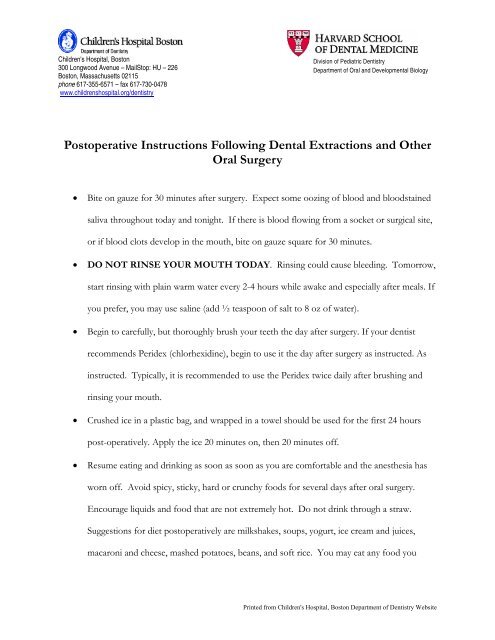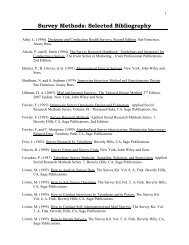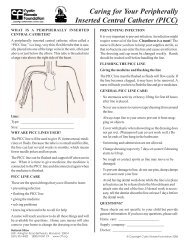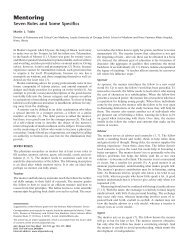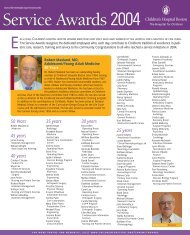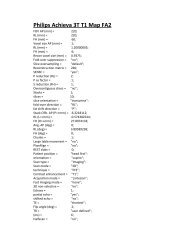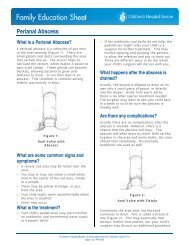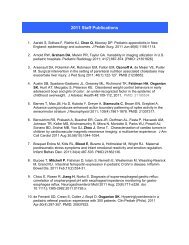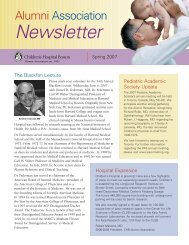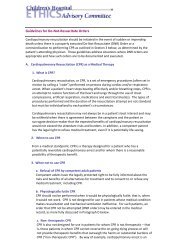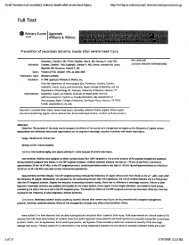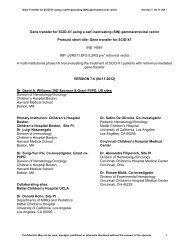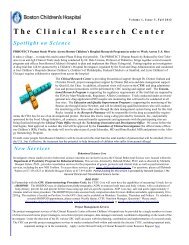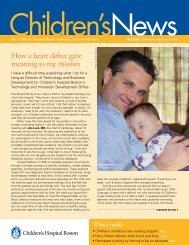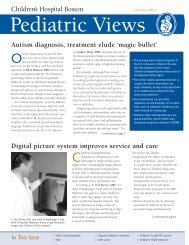Postoperative Instructions Following Dental Extractions and Other ...
Postoperative Instructions Following Dental Extractions and Other ...
Postoperative Instructions Following Dental Extractions and Other ...
Create successful ePaper yourself
Turn your PDF publications into a flip-book with our unique Google optimized e-Paper software.
Children's Hospital, Boston<br />
300 Longwood Avenue – MailStop: HU – 226<br />
Boston, Massachusetts 02115<br />
phone 617-355-6571 – fax 617-730-0478<br />
www.childrenshospital.org/dentistry<br />
Division of Pediatric Dentistry<br />
Department of Oral <strong>and</strong> Developmental Biology<br />
<strong>Postoperative</strong> <strong>Instructions</strong> <strong>Following</strong> <strong>Dental</strong> <strong>Extractions</strong> <strong>and</strong> <strong>Other</strong><br />
Oral Surgery<br />
• Bite on gauze for 30 minutes after surgery. Expect some oozing of blood <strong>and</strong> bloodstained<br />
saliva throughout today <strong>and</strong> tonight. If there is blood flowing from a socket or surgical site,<br />
or if blood clots develop in the mouth, bite on gauze square for 30 minutes.<br />
• DO NOT RINSE YOUR MOUTH TODAY. Rinsing could cause bleeding. Tomorrow,<br />
start rinsing with plain warm water every 2-4 hours while awake <strong>and</strong> especially after meals. If<br />
you prefer, you may use saline (add ½ teaspoon of salt to 8 oz of water).<br />
• Begin to carefully, but thoroughly brush your teeth the day after surgery. If your dentist<br />
recommends Peridex (chlorhexidine), begin to use it the day after surgery as instructed. As<br />
instructed. Typically, it is recommended to use the Peridex twice daily after brushing <strong>and</strong><br />
rinsing your mouth.<br />
• Crushed ice in a plastic bag, <strong>and</strong> wrapped in a towel should be used for the first 24 hours<br />
post-operatively. Apply the ice 20 minutes on, then 20 minutes off.<br />
• Resume eating <strong>and</strong> drinking as soon as soon as you are comfortable <strong>and</strong> the anesthesia has<br />
worn off. Avoid spicy, sticky, hard or crunchy foods for several days after oral surgery.<br />
Encourage liquids <strong>and</strong> food that are not extremely hot. Do not drink through a straw.<br />
Suggestions for diet postoperatively are milkshakes, soups, yogurt, ice cream <strong>and</strong> juices,<br />
macaroni <strong>and</strong> cheese, mashed potatoes, beans, <strong>and</strong> soft rice. You may eat any food you<br />
Printed from Children's Hospital, Boston Department of Dentistry Website
Children's Hospital, Boston<br />
300 Longwood Avenue – MailStop: HU – 226<br />
Boston, Massachusetts 02115<br />
phone 617-355-6571 – fax 617-730-0478<br />
www.childrenshospital.org/dentistry<br />
Division of Pediatric Dentistry<br />
Department of Oral <strong>and</strong> Developmental Biology<br />
desire, however, nothing too hot or too hard for the first day. Soft foods are preferable. Use<br />
your own discretion.<br />
• If you have cause for concern, call the <strong>Dental</strong> Department at (617) 355-6571 from 9:00 a.m.-<br />
5 p.m. During after hours <strong>and</strong> on weekends, please call the hospital page operator.<br />
• Keep your head elevated on 2 or 3 pillows during the postoperative period. This helps to<br />
keep down the swelling <strong>and</strong> bleeding. Avoid vigorous activity <strong>and</strong> bending or heavy lifting<br />
for a few days post-operatively. Also, refrain from contact sports for two to three weeks.<br />
• If you have had impacted teeth removed or exposed, expect the swelling to increase for 48<br />
hours before it starts to decrease. Discomfort may also be present for 48 hours before it<br />
starts to improve.<br />
• If pain increases on the 4 th or 5 th day after the extraction <strong>and</strong>/or if the tooth is bleeding,<br />
please call us. You may have “dry socket,” an extraction socket where the blood clot has<br />
dissolved prematurely <strong>and</strong> the socket becomes painful.<br />
• Antibiotics <strong>and</strong>/or pain <strong>and</strong> medication may be prescribed; if not, Tylenol is usually<br />
sufficient for discomfort. If a narcotic is prescribed, be cautious about driving or operating<br />
machinery while taking such medication. IMPORTANT: if any rashes or unusual symptoms<br />
occur, stop the medications immediately <strong>and</strong> call the office. Complete bed rest is not<br />
necessary; however, minimize your normal activities at least 24 hours after surgery the first<br />
day.<br />
Printed from Children's Hospital, Boston Department of Dentistry Website


